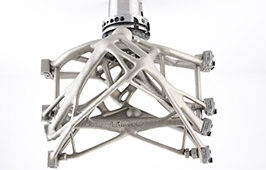 Catalysts are the enabling technology for the current chemical industry and clean energy applications such as battery and fuel cell cars. However, current catalysts have significant challenges such as structural instability and high cost. Finding new and better catalysts is paramount yet largely limited by immiscibility among elements and slow experimentation. Researchers at the University of Maryland invented a disruptive high-temperature shock technique (e.g., 2000 K within 1 sec) and opened a new material space of multielement high entropy alloy catalysts, which exhibit significantly higher performance and stability than few-element catalysts. The rapid synthesis further enables data-driven, accelerated exploration, and continuous optimization in the unlimited multielement space for various catalytic reactions. This technology was initially reported in Science and further developed as a product in 2019. It has raised significant interests from industry and government agencies (e.g. funding from Maryland Innovation Initiative and Dept. of Energy ARPA-E). High entropy alloy catalysts will become next-generation, game-change catalysts for a wide range of fields, including battery and fuel cells, chemical and drug production.
Catalysts are the enabling technology for the current chemical industry and clean energy applications such as battery and fuel cell cars. However, current catalysts have significant challenges such as structural instability and high cost. Finding new and better catalysts is paramount yet largely limited by immiscibility among elements and slow experimentation. Researchers at the University of Maryland invented a disruptive high-temperature shock technique (e.g., 2000 K within 1 sec) and opened a new material space of multielement high entropy alloy catalysts, which exhibit significantly higher performance and stability than few-element catalysts. The rapid synthesis further enables data-driven, accelerated exploration, and continuous optimization in the unlimited multielement space for various catalytic reactions. This technology was initially reported in Science and further developed as a product in 2019. It has raised significant interests from industry and government agencies (e.g. funding from Maryland Innovation Initiative and Dept. of Energy ARPA-E). High entropy alloy catalysts will become next-generation, game-change catalysts for a wide range of fields, including battery and fuel cells, chemical and drug production.





Tell Us What You Think!